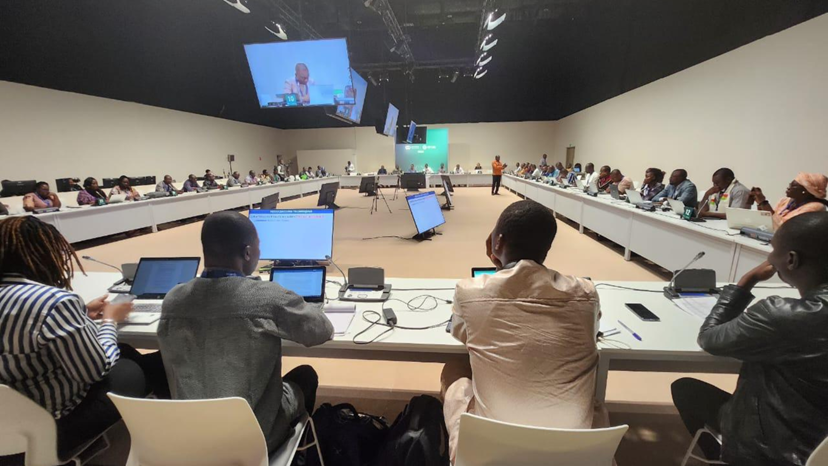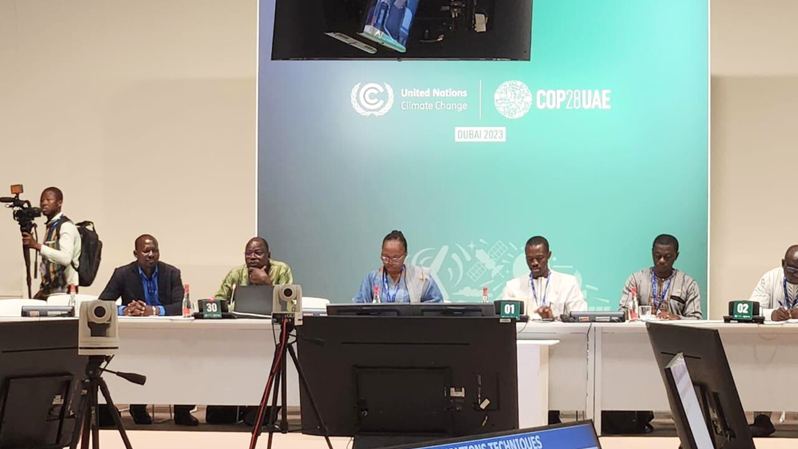
COP28: Putting the Sideshow Centre Stage
21st December 2023As the dust settles from another COP, Tree Aid CEO Tom Skirrow and advocacy advisor Annie Schultz reflect on key moments.
As a leading international NGO working in the drylands of Africa, Tree Aid was proud to be a part of this crucial global gathering, bringing the voices and experiences of these communities to the forefront of the climate change conversation. Each one of these conferences has pushed the needle a little further towards recognising the urgency and pace of action required to keep the rise of global temperatures to 1.5 degrees. We’re moving, but not nearly at the pace required.
But it was the sideshow where we saw the most hope and drive for change. We hosted events at the Burkina Faso pavilion and shared inspiring stories of how trees, soil regeneration, and sustainable land management practices are empowering people to adapt to climate change and build resilience for the future.
Empowering local voices and partnerships

Our first event showcased expert speakers from the mosaic coalition of the Great Green Wall – an ambitious green movement to tackle the effects of climate change and grow a belt of trees across the width of the African continent.
As partners in the coalition, we were proud to showcase the transformative impact of nature-based solutions on climate-resilient livelihoods in dryland communities.
Our event explored how we can make Great Green Wall funding more accessible to communities to help accelerate this African-led effort.
A key message from our panellists was that to scale high-integrity carbon finance, civil society organisations and NGOs need better access to international public finance to scale crucial pre-investment groundwork.
Launching Tond Tenga: Setting best practice for carbon investment

We were incredibly proud to launch our new project, Tond Tenga, at our second side event. This project in Burkina Faso is an innovative and ethical carbon model, where communities receive a fair share of the money raised from the sale of carbon credits. This money is a rightful benefit, bought from restoring the land that the communities are custodians of.
The launch event featured a compelling panel discussion, bringing together leading voices from the Great Green Wall movement. Our focus was on exploring strategies to scale investments that not only advance nature-based solutions but also empower local communities.
Meaning ‘Our Land’ in Mòoré, the most commonly spoken language in Burkina Faso, Tond Tenga is a 30 year-long project that will see transformational financial flows to local communities.
World leaders discuss carbon markets

We attended a roundtable discussion between world leaders, looking at high-integrity carbon projects, like Tond Tenga, which have the potential to unlock crucial climate finance that fairly compensates local communities for land restoration where it is needed most.
In addition to key voices from committed countries, the roundtable featured addresses from leaders, including COP28 President Dr Sultan Al-Jaber, UNFCCC Executive Secretary Simon Stiell, World Bank Group President Ajay Banga, and GFANZ Co-Chair and UN Special Envoy for Climate Finance Mark Carney.
They highlighted that though they are no substitute for government and private action to decarbonise quickly and ambitiously, they are a vital tool to finance our transition and offer “the best way to transfer resources from the rich world to the developing world” (Ajay Banga, The World Bank) at the pace and scale needed.
Key moments for African Drylands and the Great Green Wall
Over at the EU pavilion, we heard Tony Agotha, Special Envoy for Climate and Environment Diplomacy, reaffirm EU support for the Great Green Wall: “The Great Green Wall is, quite literally, a bulwark against deforestation and the impacts of climate change.”
He recognised average temperatures in Africa’s drylands are rising 1.5 times faster than the global average, and people living in this region are facing hardships that affect their lives and livelihoods – lives that are already difficult to begin with.
We also saw the launch of the African Development Bank Group-Civil Society Coalition on Climate and Energy – a group of African NGOs making a joint declaration recognising the role of civil society in tackling the climate crisis, as well as the need for more climate funding to reach African communities. They also identified key priorities—adaptation, loss and damage; food and land use systems, protection, and restoration of forests.
A breakthrough declaration
On the first Relief Recovery and Peace Day, a declaration was signed by 74 countries calling for bolder collective action to build climate resilience at the scale and speed required in highly vulnerable countries and communities, particularly those threatened or affected by fragility or conflict, or facing severe humanitarian needs.
This transformational opportunity will have important implications for the Sahel and the Great Green Wall, calling for the scale-up of climate finance. We demonstrated this with the launch of our project Tond Tenga, and are impatient to replicate this model across many more of the Great Green Wall rural communities
Looking ahead: A call for action

As we move forward from COP28, Tree Aid remains committed to working alongside local communities, governments, and partners to scale up nature-based solutions and drive transformative change African drylands.
We must continue to bring the voices of those on the frontline of the climate crisis to the fore – those who will suffer most from a failure in leadership but also more than anything: they offer us the hope that with their power and determination, change is possible.
